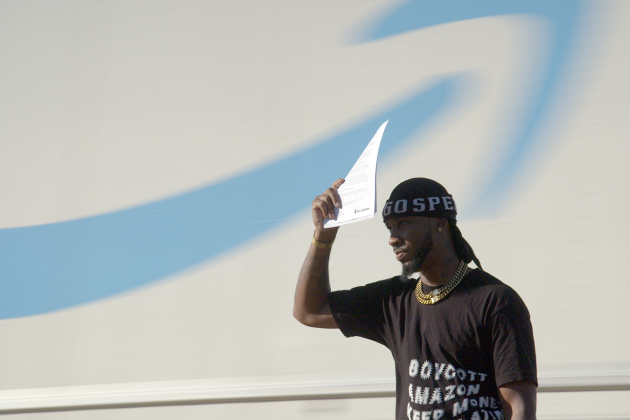‘Union’ Filmmakers Talk Amazon, Labor Unions and Jeff Bezos’ Possible Response to the Documentary
- Oops!Something went wrong.Please try again later.
- Oops!Something went wrong.Please try again later.

In “Union,” documentary filmmakers Brett Story and Stephen Maing follow the Amazon Labor Union (ALU), a group of current and former Amazon workers as they attempt to unionize Amazon employees working at a facility in Staten Island, N.Y. The directing duo chronicles just how excruciatingly hard it is to form a workers’ union in America — especially at Amazon. The 102-minute doc captures ALU members, who feel disenfranchised and powerless, as they try to build support for their movement while facing the unlimited resources and influence of a corporate giant. From offering free pizza and cannabis to making calls to all 8,000 Amazon employees working at the Staten Island facility, the film intimately documents ALU’s fierce dedication to making a change.
Variety spoke to Story and Maing ahead of the premiere of “Union” on Sunday.
More from Variety
In the film an ALU member records a meeting that takes place within the Staten Island facility. Was it your idea to have an ALU member go in and get that footage?
Maing: The videos that you see in the film that are inside [the Amazon facility] were all worker-organizer produced films that were actually part of the work that they were doing to document the conditions of both their workplace as well as the the violations against labor law that did actually permit them to talk about the [ALU]. That was something that they wanted to absolutely have documentation of to prove that this was not a loving, level playing field.
Amazon describes itself as a company that “strives to be Earth’s most customer-centric company, Earth’s best employer and Earth’s safest place to work.” This doc makes it clear that their efforts are clearly not working. Do you think Amazon founder Jeff Bezos will come after this doc or have anything to say about it?
Story: I don’t know if he will ever find out [about it]. There will probably be a strategic response that [Amazon] will give if they do acknowledge the film.
Maing: Amazon is the second-largest employer in the United States currently. A single documentary is not going to take down Amazon. In a lot of ways their self-assigned moniker of wanting to be the greatest employer on Earth, that’s really important to not overlook or dismiss. As a corporation they must have thought very long and hard about that. So to embrace the message of a film [made by a team] who spent three years really considering deeply and thoughtfully the experience of their workers seems like something that they actually might want to really consider.
You are looking for distribution. Any concern that major streamers won’t want to buy the doc because they don’t want to piss off Bezos?
Story: If I was a broadcast executive I would think it is really smart and strategic to buy a film like this. Because this is a film that’s also about a new generation. This is a film about millennials. This is a film that’s about a group of people who have grown up in a totally different economy from the coal miners and the auto workers. They have grown up in a time when the climate is in crisis and they’ve got massive debt. It’s a really political generation. This is the kind of film that could have a huge audience.
Maing: [We have] a generation of organizers and workers who are willing to go to greater and greater extremes to show how strike-ready they are. So it’s a very sobering moment probably for corporations to really have to consider what they value.
There are no interviews in the doc with Amazon employees actively fighting the ALU. Did you ever consider interviewing one of the union busters?
Story: We did a fantastic interview with one of [the union busters] that was really interesting in terms of getting that perspective. But in the edit, we had to decide and commit to the language of the film and for us it was really important to offer this really intimate view of a group of organizers in an observational mode. We didn’t want to break up that intimacy with interviews that would feel like they were just outside of the vocabulary of the film. So maybe something else will be done with that particular interview.
Best of Variety
Sign up for Variety’s Newsletter. For the latest news, follow us on Facebook, Twitter, and Instagram.
